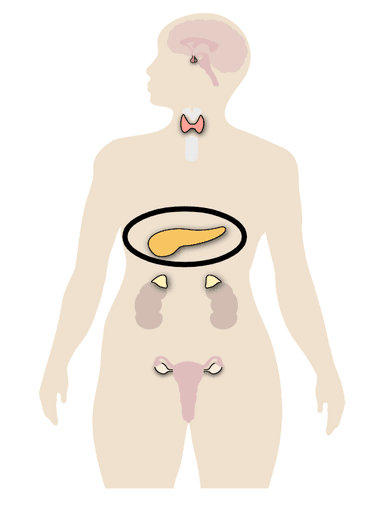Insulin, glucagon and the control of blood sugar level
I can describe the role of the hormones insulin and glucagon in controlling blood sugar level.
Insulin, glucagon and the control of blood sugar level
I can describe the role of the hormones insulin and glucagon in controlling blood sugar level.
These resources will be removed by end of Summer Term 2025.
Lesson details
Key learning points
- If conditions in the body change too much, this can be dangerous to our health.
- Glucose travels in the blood and is delivered to cells for respiration.
- The hormones insulin and glucagon help to keep human blood sugar level constant.
- The pancreas secretes insulin when blood sugar level is too high; the liver absorbs glucose and coverts it to glycogen.
- The pancreas secretes glucagon when blood sugar level is too low; the liver converts glycogen into glucose in the blood.
Keywords
Respiration - a chemical reaction in livings organisms that releases energy from glucose
Glucose - is a sugar that travels in the blood and is supplied to cells for respiration
Glycogen - is a stored form of glucose found in liver and muscle cells
Insulin - a hormone secreted by the pancreas when blood glucose is too high, lowering blood glucose levels
Glucagon - a hormone secreted by the pancreas when blood glucose is too low, increasing blood glucose levels
Common misconception
Not linking the idea that glucose concentration is important for cellular respiration, even during times of rest.
There are a selection of slides in LC1 that specifically link glucose and respiration and discuss the idea of respiration occurring during rest.
To help you plan your year 10 biology lesson on: Insulin, glucagon and the control of blood sugar level, download all teaching resources for free and adapt to suit your pupils' needs...
To help you plan your year 10 biology lesson on: Insulin, glucagon and the control of blood sugar level, download all teaching resources for free and adapt to suit your pupils' needs.
The starter quiz will activate and check your pupils' prior knowledge, with versions available both with and without answers in PDF format.
We use learning cycles to break down learning into key concepts or ideas linked to the learning outcome. Each learning cycle features explanations with checks for understanding and practice tasks with feedback. All of this is found in our slide decks, ready for you to download and edit. The practice tasks are also available as printable worksheets and some lessons have additional materials with extra material you might need for teaching the lesson.
The assessment exit quiz will test your pupils' understanding of the key learning points.
Our video is a tool for planning, showing how other teachers might teach the lesson, offering helpful tips, modelled explanations and inspiration for your own delivery in the classroom. Plus, you can set it as homework or revision for pupils and keep their learning on track by sharing an online pupil version of this lesson.
Explore more key stage 4 biology lessons from the Coordination and control: hormones and the human endocrine system unit, dive into the full secondary biology curriculum, or learn more about lesson planning.

Equipment
None required.
Licence
Starter quiz
6 Questions

increase in blood glucose concentration
decrease in blood glucose concentration
Exit quiz
6 Questions
blood glucose too high
blood glucose too low


